Shepherds of Christ
Daily Writing

|
Shepherds of Christ |
 |
December 13, 2010
December 13th Holy Spirit Novena
Scripture selection is Day 7 Period I.The Novena Rosary Mysteries
for December 13th are Joyful.
Come and pray December 17th
6:20pm Clearwater, Florida
14th anniversary of
Mary's apparition.
We need funds for the mailing
of Fr. Joe's book
Our Lord wants out.
Call 1-888-211-3041
Give gifts that last.
Please remember us when buying
your Christmas gifts.
Can anyone please help us payoff
our loan on the building?
We need to print the
Tiny Tot Rosary Books.
Can anyone please help us with the this?
1-888-211-3041
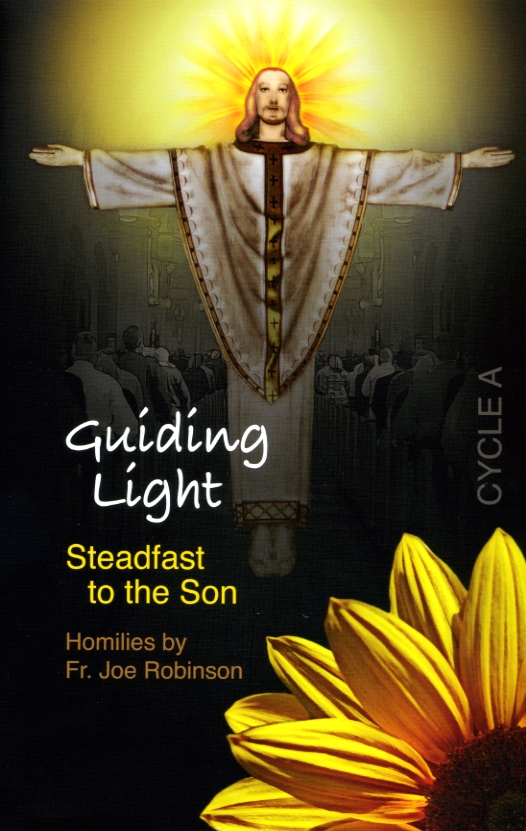
We need to reprint the Cycle A Homily Book
Please help us to reprint the book
to send to the priests.1-888-211-3041
December 13, 2010
Excerpt from Response to God's Love
The Christian's Personal Uniqueness
Obviously, we all assimilate the mystery of Christ in basically the same way. There are, however, significant differences in how each person puts on Christ that result from the uniqueness of each individual. Each person is a unique expression of God's creative love. Each person can truthfully say that there has never before been anyone like himself or herself, there is now no one like him or her, and there never will be.
The personal uniqueness of each human being increases in proportion to one's assimilation to Jesus. That is to say, the more I put on Christ, the more I lose myself in Christ, the more I become myself. This is true because grace perfects nature, and, consequently, the more I grow in grace, the more perfect all dimensions of my person become—and this includes uniqueness. We see, then, how fallacious is the reasoning of those who think that the more they give themselves to the practice of religion, the more their personalities will be subdued. Actually, the opposite is true—the more one grows in Christ, the more his or her unique personality emerges in all its attractiveness.
As I grow in the realization of my own uniqueness, I should also grow in developing a sense of self-identity and self-acceptance. If God in his tremendous love for me has created the uniqueness that I am, should I not rejoice in who I am and avoid morbidly comparing myself to others? Should I not have a healthy self-image? Of course, self-acceptance does not mean self-complacency. Honest self-reflection will always reveal to me that there are weaknesses that must be further curbed and strengths that must be further developed.
As God gives each person his or her uniqueness, he attaches to it a unique mission or role that is to be accomplished. Cardinal Newman tells us: "Everyone who breathes, high and low, educated and ignorant, young and old, man and woman, has a mission, has a work. We are not sent into this world for nothing; we are not born at random. . . . God sees every one of us; He creates every soul, He lodges it in a body, one by one, for a purpose. He needs, He deigns to need, every one of us" (Discourses Addressed to Mixed Congregations, pp. 111-112).
Because of the uniqueness of each Christian's existence, he or she presents Christ with a unique opportunity. Each Christian has the vocation to offer Christ his or her humanity so that Jesus can re-incarnate himself in a new way. Jesus wants to continue his redemptive work through the not-to-be-repeated newness that is each Christian's uniqueness. To the extent that an individual Christian offers his or her humanity to Jesus, he or she has a unique opportunity to continue the redemption—an opportunity that no one else can offer him or her. Likewise, to the extent that an individual Christian fails to offer his or her humanity to Christ, Jesus loses the opportunity that is this Christian's uniqueness.
Each of us, consequently, no matter what his or her occupation or status in life might be, has both the great privilege and the great responsibility to properly utilize his or her life according to God's Christic design. No one else can fulfill your unique mission, and, in turn, you cannot accomplish the unique mission of another. At times we can become somewhat fearful or anxious about the task that God has entrusted to us as we more deeply realize what it demands. We can feel the same reluctance that Jeremiah the prophet voiced when Yahweh called him:
The word of the LORD came to me thus:
"Before I formed you in the womb I
knew you,
before you were born I dedicated
you,
a prophet to the nations I appointed
you."
"Ah, LORD GOD!" I said,
"I know not how to speak; I am too
young."
But the LORD answered me,
"Say not, 'I am too young.'
To whomever I send you, you shall
go;
Whatever I command you, you shall
speak.
Have no fear before them,
because I am with you to deliver
you, says the LORD."
—Jer 1:4-8Jeremiah initially shrank back from the mission that God was giving him. He complained that he was not capable of accomplishing it. God answered him, however, and told Jeremiah that he was perfectly capable of fulfilling his appointed role, for he, Yahweh, would be with Jeremiah. God would work through Jeremiah, and Jeremiah, for his part, was to be open to God, allowing Yahweh to work through him according to the divine will.
We, too, can be guilty of reacting to God's call in the same way that Jeremiah had originally reacted. This can happen as God calls one to a basic state of life. Once a person is within a fundamental vocation, one can be tempted to resist God's call to higher things, to a more complete accomplishment of his or her mission, and to a greater Christian maturity. When so tempted, a person must control his or her fears and trustingly give himself or herself to God's will. Only then will the person become convinced that God never requests anything without granting abundant grace to accomplish his design, and that, moreover, to answer God's call as consistently as possible is the only true path to peace, happiness, and fulfillment, despite the pain that is necessarily involved.
We are aided in remaining faithful to the unique role in life that God has given us if we strive to remain aware of the great value that one life has to Christ, to the Church, and to the world. History tells us of the great difference that just one life can have regarding Christ's work; there are outstanding examples from all walks of life. Surely the Church has been enriched, and countless lay people have been inspired because of the life of a man named Thomas More. He was a layman who realized the deepest meaning of life—and he did not fail to confront the true purpose of human existence, even when that confrontation meant sacrificing his life for what he believed. Surely this life—the one life of St. Thomas More—has made a difference. In our own times, we have been enriched and inspired by an outstanding lay witness—the beloved Dorothy Day. What an inspiration she has been! Surely her life, though it was only one life, made a difference—and such a great difference. There are, too, the examples of men and women who have established religious orders and congregations. Surely the life of each of them has made an overwhelming contribution toward a better Church and a better world. Consider also the life of Angelo Giuseppe Roncalli, a person from a peasant background who eventually came to be called Pope John XXIII. Surely the world is so much better for Pope John's having given it his love, kindness, joy, and constant concern. Of course one life does make a difference.
At this point, however, many will object that the above examples highlight the lives of persons who have achieved outstanding recognition in the external order of things and have commanded great public attention. People who voice this objection often say that their own lives are so mundane, so hidden, so incapable of making headlines. Surely, they continue, this rather too ordinary kind of life makes little difference to Christ, to the Church, and to the world. Surely it does not much matter whether a person living this kind of existence fulfills his or her God-given mission. At first glance, many of us would tend to agree with this reasoning, a reasoning that is really the exact opposite temptation of what we considered when we likened ourselves to Jeremiah. In that context there was a question of being tempted to do nothing because we feared the greatness to which we were called; in the present context, however, it is a question of being tempted to do nothing because we think we really have nothing to contribute. Yet, as we begin to reflect in mature faith, we soon see the fallacy of this objection. We realize that great external accomplishments or a life that attracts public attention do not, in and of themselves, make that life great and truly worthwhile. If a Christian life that is characterized by notable external achievement is truly great and meaningful for mankind, we know that it is so because the external achievement has sprung forth from an attitude of deep faith, hope, and love. This, then, is the ultimate answer to the above objection—every Christian's life, no matter how ordinary it might be in its external framework, can be tremendously important and can make an outstanding contribution toward the work of ongoing redemption as long as it is increasingly consistent with God's will.
God's ways are not always our ways, and his thoughts are not always our thoughts. God can take a life that seems so ordinary, so prosaic, so uneventful, and achieve wonders with it as long as the person is striving to fulfill his or her role in life according to God's designs. We cannot, then, use the ordinariness of our lives as an excuse for not making our existence truly great, truly significant for both Christ and humanity—a life that truly makes a difference. Karl Rahner has advice for us when the ordinariness of our lives tempts us to think that our existence is unimportant and almost useless: "Let us take a good look at Jesus who had the courage to lead an apparently useless life for thirty years. We should ask him for the grace to give us to understand what his hidden life means for our religious existence" (Spiritual Exercises, p. 160). Notice that Rahner describes the first thirty years of Jesus' life as "apparently useless." In reality, of course, Christ's very ordinary existence at Nazareth was not actually useless but was, on the contrary, tremendously important—it was part of his redemptive effort. No, it is not the ordinary setting of our lives that is an obstacle to our making a unique and important contribution to the cause of Christ. The real obstacle, if we allow it, is our failure to relate to life's ordinariness as God intends.
The realization of the greatness of our own lives, however, must be balanced with a realization of the limitations that are attached to that greatness. We are finite creatures who have various limitations that emanate from our finitude. A sense of limitations, then, should accompany the fulfillment of our mission in life.
What are some of these limitations? First, it is important to realize there are false limitations—limitations that need not be—as opposed to inevitable limitations—limitations that spring forth from the fact that we are finite creatures who are immersed in the human condition. An example of a false limitation is demonstrated by the person who succumbs to the temptation of wanting to be someone else. This person looks at the physical and intellectual gifts of one person, the pleasing personality of another, and so forth and so on, and convinces himself or herself, that, if only he or she were endowed with such qualities, well, yes, then it would be possible to really accomplish something with his or her life. In other words, the person fails to accept himself or herself as God has made him or her. This person fails to accept his or her God-given uniqueness and wastes precious time looking at what he or she does not have, rather than appreciating that with which God has actually endowed him or her. Such a person must accept himself or herself, once and for all, in his or her fundamental uniqueness. Moreover, this person must develop the gifts, strengths, and capacities of his or her uniqueness and strive to control its weaknesses as much as possible. He or she should also realize that only by accepting his or her uniqueness as coming from God's creative love and constantly striving to allow that same love to bring his or her uniqueness to fulfillment will he or she achieve ultimate peace and happiness. Then, and only then, can a person properly make his or her contribution to continued redemption.
Surrounding our uniqueness, then, are limitations that need not be; similarly, there are also limitations that are inevitable. We possess certain talents, for example, but present circumstances do not allow us to exercise these talents here and now. Even at those times when we can exercise our talents, we often feel limited because we realize that we have only a certain amount of energy; that there are only a certain number of concrete opportunities and a certain amount of time for us to use our talents. At other times we feel limited because the persons we are trying to serve are hostile to our efforts and shut themselves off from what we desire to so generously offer.
These, then, are some examples of limitations we can experience in our efforts to fulfill our mission. To balance the realization of the greatness of our call with the realization that we will be variously limited—sometimes painfully so—in our striving to implement our mission is as necessary as it is challenging.
Each Christian, therefore, because of his or her personal uniqueness, has a unique mission to fulfill in helping continue the work of Jesus. Each Christian is given the opportunity to contribute as he or she receives the call from God, and, obviously, there are varying degrees according to which a Christian may respond or not respond to God's call. There are, first, those who hardly respond at all, who seem to be barely Christian. They may have faith, but it is a dead faith, for they refuse to be guided by God even in serious matters. They want to be complete masters of their own existence; the less they have to think about God, the better. Originally, some of these people may have been given a call to magnificent Christian greatness in this or that state of life. They may have turned a deaf ear to true greatness, however, and determined to be makers of their own self-conceived greatness; their concept of greatness may never have transcended the limits of space and time—they may have thought and acted as if their temporal existence would extend forever.
Second, there are other Christians who essentially respond to God, but not as completely as possible. Their lives seem to be an average mixture of both continuing faithfulness to God and occasional disloyalty to him; periodically they accomplish much good, but they also mix in a considerable degree of mediocrity. They do, however, seem to be basically sincere Christians who do, in fact, promote the work of Christ and essentially fulfill their roles in life.
And finally, there are those Christians who initially answer God's call and continue to answer it in an eminently generous manner. They develop their uniqueness marvelously and become forceful shapers of the world's Christic destiny. Their good actions are deeply etched into the human process, although they may well be hidden from public acclaim. Because of them and their actions, the world's goodness is enhanced, and mankind has come considerably closer to fulfilling its temporal and eternal destinies.
Today's Church needs more of this type of Christian. The Church and the world in which she is situated are experiencing a time of crisis—perhaps the most critical time of all history, for at what other time in human history could life as we know it on this earth end so suddenly in a nuclear holocaust? Yet, although we live in an age of special crisis that has tremendous and numerous problems, we also live in an age of great opportunity. God, for his part, always provides for the needs of both the Church and the world in which the Church is meant to serve. Surely, in this age of great need and opportunity, God will not fail to call Christians of all vocations to completely and eminently dedicate themselves to the task at hand. We should pray that everyone will respond according to their own uniqueness and make their own special contribution to the work of Christ.
Sixteenth Sunday of Ordinary Time
July 19, 2009
HOMILY: There was a man who worked in a museum whose job it was to explain the different exhibits. On one occasion he pointed to the bones of a dinosaur saying the bones were 100 million and 9 years old. Someone asked how they could date those bones so accurately. He said “well, when I started working here, I was told these bones were 100 million years old and I’ve worked here for nine years.”
Today I want to give everyone a little history lesson. I’m not going back to the dinosaurs, but I am going back pretty far – to King David, 1000 years before Christ. When I was in school, I hated history. It wasn’t until we studied the history of the Old Testament in the seminary that I began to appreciate it. I cannot cram 1000 years of history into a couple of minutes. I just want to touch on the parts of Jewish history that are mentioned in today’s reading. If you want to learn more, read everything in the Old Testament, but be sure you have a commentary to help you. Otherwise, you’ll give up in despair because you won’t know what it’s all about - especially the prophets and the historical books.
When David was king 1000 years before Christ, David wanted to build a house for God, since there was no Temple for God at that time. God did not give David permission to do so, however God promised David through the prophet Nathan that he would bless him and build David a house in the sense that David’s kingdom would continue forever and one of his descendants would always rule. This blessing lasted through the reign of David’s son, Solomon; but we humans somehow have the ability to sabotage God’s blessings. Solomon turned to pagan gods and over-extended the country financially by elaborate building projects and exorbitant taxes, so when Solomon died there was a rebellion and most of Israel broke away from Solomon’s successor, David’s grandson, Rehoboam. Rehoboam continued to rule over the southern part of Israel, the area we know as Judaea . For 400 years (and this is amazing) the kings of Judaea were descendants of King David. The northern kingdom that rebelled against David’s successors suffered under a succession of kings and rebellions. In less than 300 years the northern kingdom was destroyed by the Assyrians, people from northern Iraq. About 100 years after that, the Babylonians from southern Iraq conquered the Assyrians and took control of the entire Middle East. The conquest of the Babylonians brings us up to Jeremiah whom we heard in today’s first reading. At the time of Jeremiah, here was the situation: the northern kingdom no longer existed. The southern kingdom, Judaea, was still being ruled by David’s descendants but they were not loyal to God or to God’s laws. Jeremiah spoke to these kings as they came into power, the last four being: Jehoahaz, Jehoiakim, Jehoikin and Zedekiah. Zedikiah, the last reigning king, died in disgrace. After the Babylonians captured him, his sons were slaughtered before his eyes, he was then blinded and led off to Babylon in chains where he presumably died. You can read how Jeremiah spoke with them in great detail in the book of Jeremiah. He told them exactly what they needed to do to survive the invading forces of Babylon. His messages were ignored. He blames them and their leadership for the destruction that came upon God’s people. As we heard in today’s first reading, God speaks through Jeremiah: “Woe to the shepherds who mislead and scatter the flock of my pasture.” God said he would take over shepherding his people; he would bring them back from exile; he would appoint leaders over them who would serve them well and lead them to peace and security. It took 600 years before God thought the world was ready for this king who would reign and govern wisely, who would do what is just and right in the land.
But then he came, through the announcement of an angel to a virgin who was engaged to a man named Joseph of the house of David, and the virgin’s name was Mary. And the angel said to her “Do not be afraid Mary, for you have found favor with God. Behold, you will conceive in your womb and bear a son, and you shall name him Jesus. He will be great and will be called Son of the Most High, and the Lord God will give him the throne of David his father, and he will rule over the house of Jacob forever, and of his Kingdom there will be no end.”
In last week’s gospel, Jesus sent his apostles out to heal and cast out demons and to call people to repentance. In today’s gospel we are told of their return, excited over their experience and tired. Jesus wanted to some time off, but he couldn’t. The mission of Jesus and his apostles apparently was so successful that a great crowd caught up with them before they had chance to catch their breath. Mark describes Jesus taking compassion on them (his heart was moved with deep sympathy for them would probably be a better translation). He saw them as sheep without a shepherd, - people without leadership, and he began to teach them.
One of the important messages in today’s readings is that in love our Lord leads us, by teaching us and appointing others to teach us. But we need to listen, and we need to keep on listening. We’ll never be finished listening and learning as long as our world suffers from injustice, poverty, hunger, discrimination, war, hatred and killing of innocent people. Christ would be put to death before he would stop teaching. It is to our own great loss when we stop listening. That’s one of the reasons we are here each weekend, to listen and to learn. We call ourselves disciples. The word disciple means learner. When we’ve quit learning, we’ve quit being a disciple.

Jeremiah DVD available
$15.00 free postage

Esther DVD available
$15.00 free postage
Jeremiah answered God's call
Jeremiah did not shrink back
from what God asked of him.
From the Priestly Newsletter Book III - 2000 Issue 3 p. 44-47
The Father's Will for Us — Our Source of Peace
14
Pope John Paul II instructs us: "The Church, as a reconciled and reconciling community, cannot forget that at the source of her gift and mission of reconciliation is the initiative, full of compassionate love and mercy, of that God who is love (see 1 John 4:8) and who out of love created human beings (see Wisdom 11:23-26; Genesis 1:27: Psalms 8:4-8)…He created them so that they might live in friendship with Him and in communion with one another.
"God is faithful to His eternal plan even when man, under the impulse of the evil one (see Wisdom 2:24) and carried away by his own pride, abuses the freedom given to him in order to love and generously seek what is good, and (instead) refuses to obey his Lord and Father. God is faithful even when man, instead of responding with love to God’s love, opposes Him and treats Him like a rival, deluding himself and relying on his own power, with the resulting break of relationship with the One who created him. In spite of this transgression on man’s part, God remains faithful in love.
"It is certainly true that the story of the Garden of Eden makes us think about the tragic consequences of rejecting the Father, which becomes evident in man’s inner disorder and in the breakdown of harmony between man and woman, brother and brother (see Genesis 3:12 ff; 4:1-16). Also significant is the Gospel parable of the two brothers (the parable of the ‘prodigal son’; see Luke 15:11-32) who, in different ways, distance themselves from their father and cause a rift between them. Refusal of God’s fatherly love and of His loving gifts is always at the root of humanity’s divisions.
"But we know that God…like the father in the parable (of the prodigal son), does not close His heart to any of His children. He waits for them, looks for them, goes to meet them at the place where the refusal of communion imprisons them in isolation and division. He calls them to gather about His table in the joy of the feast of forgiveness and reconciliation.
"This initiative on God’s part is made concrete and manifest in the redemptive act of Christ, which radiates through the world by means of the ministry of the Church." 13
In the evening of that same day, the first day of the week, the doors were closed in the room where the disciples were, for fear of the Jews. Jesus came and stood among them. He said to them, ‘Peace be with you,’ and, after saying this, he showed them his hands and his side. The disciples were filled with joy at seeing the Lord, and he said to them again, ‘Peace be with you. As the Father sent me, so am I sending you.’ (Jn 20:19-21).
The world needs peace. Individual nations need peace and families need peace. The Church needs peace. Each of us individually needs peace. We must work for peace through prayer, fasting, and other Christ-like activities.
And just what do we mean by peace? St. Augustine says peace is the tranquility of order. God has put order into His creation and this order must be respected and promoted if peace is to prevail. To the extent that the human family lives according to God’s will—lives according to the order or the plan God has established for creation—to that extent does peace exist in the various segments of human society. To the extent there are violations of God’s plan, of His will, to that extent peace is absent.
If we are to be instruments of peace, we ourselves must be at peace. Our personal peace is that tranquility of order which results from our doing God’s will. The more we are united through love with God in the doing of His will, the more we experience peace.
Sometimes the sense of peace we experience is so strong that we can "feel" it pulsating throughout our being. These are periods of what we may call the experience of extraordinary peace. This type of peace usually is not an everyday occurrence.
Most of the time we live immersed in a more subdued kind of peace which results from our daily attempts to do God’s will in love. It is that peace which is a welcome and sustaining companion as we walk the path of everyday life with its usual assortments of joys and disappointments, successes and failures, laughter and tears.
Occasionally, very deep suffering may enter our lives. It is during these times that we need special determination to preserve ourselves in a basic peace of spirit despite the very significant pain. One may wonder how a person can be at peace amidst the experience of great suffering. St. Francis de Sales in one of his writings—and I have not been able to locate the exact place—offers an analogy which I think is very helpful. He asks us to picture an ocean body of water at the time of a violent storm. The surface of the water becomes extremely turbulent. Francis asks us, as we use our imagination , to descend beneath the surface of the water into its depth. What do we find? The more deeply one descends away from the turbulent surface, the calmer the water becomes. Likewise, says the saint and doctor of the Church, should it be with us during times of profound suffering. Although the surface of the spirit may be very agitated, one can still maintain basic peace of spirit by going deep down to one’s center where God is more directly experienced. Here the person experiences a calm, a basic peace, although the suffering remains.
If we are trying to do God’s will in love, God intends us to be at peace. The more we conform to God’s will, the more we are living according to the order He intends for us. In turn, the more our lives are in harmony with the order established by God, the more we experience peace—peace being the tranquility of order. The more we ourselves live in this manner, the more fit instruments we become for promoting God’s order and consequent peace throughout the various segments of society.
St. Dominic was an outstanding witness to the peace of the Lord: "Dominic possessed such great integrity and was so strongly motivated by divine love, that without doubt he proved to be a bearer of honor and grace. He was a man of great equanimity, except when moved to compassion and mercy. And since a joyful heart animates the face, he displayed the peaceful composure of a spiritual man in the kindness he manifested outwardly and by the cheerfulness of his countenance."
Shortly before he was to die from cancer, Joseph Cardinal Bernardin left us these inspiring words about peace: "It is the first day of November, and fall is giving way to winter. Soon the trees will lose the vibrant colors of their leaves and snow will cover the ground. The earth will shut down, and people will race to and from their destinations bundled up for warmth. Chicago winters are harsh. It is a time of dying.
"But we know that spring will soon come with all its new life and wonder.
"It is quite clear that I will not be alive in the spring. But I will soon experience new life in a different way…
"What I would like to leave behind is a simple prayer that each of you may find what I have found—God’s special gift to us all: the gift of peace. When we are at peace, we find the freedom to be most fully who we are, even in the worst of times. We let go of what is non-essential and embrace what is essential. We empty ourselves so that God may more fully work within us. And we become instruments in the hands of the Lord."15
St. Teresa of Avila, one of the three women doctors of the Church, tells us how the spiritual life is summed up in loving conformity to the Father’s will:
"All that the beginner in prayer has to do — and you must not forget this, for it is very important — is to labor and to be resolute and prepare himself with all possible diligence to bring his will in conformity with the will of God. As I shall say later, you may be quite sure that this comprises the very greatest perfection which can be attained on the spiritual road."16
Again she states: "...love consists ... in the firmness of our determination to try to please God in everything." 17
___________
13. Pope John Paul II, as in Celebrate 2000!, Servant Publications, pp. 140-141.
14. "From the Various Writings of the History of the Order of Preachers," as in The Liturgy of the Hours, Catholic Book Publishing Co., Vol IV, p. 1302.
15. Joseph Cardinal Bernardin, The Gift of Peace, Loyola University Press, pp. 151-153.
16. St Teresa of Avila, Interior Castle, translated by E. Allison Peers, Doubleday and Co., "Second Mansions", p. 51.
17. Ibid., "Fourth Mansions", p. 76.
Everyday and its Possibilities by Fr. Edward J. Carter, S.J. p. 128-130
IT'S BETTER TO LOVE AND BE HURT THAN NOT TO LOVE AT ALL
One of the most common and distressing pains experienced in living within the human condition is the hurt resulting from loving. One of the reasons love-hurt is so painful is that in loving we make ourselves very vulnerable. We expose the most tender part of the heart when we love, and, as a result, we keenly feel the wounds involved.
There are various types of pain possible as we love all in general and a relatively few especially. What are some of these love-sufferings? Regarding our love-service to others, we all know from personal experience that there are occasions when we are not duly appreciated. We give our reasonable best in whatever our work, or profession, or service may be, yet we are at times taken for granted, unnoticed, unpraised, and perhaps even ridiculed and laughed at. We know it's not the right thing to do to quit loving, because we did not give our love on the condition that it be returned. But the hurt is still there, and sometimes intensely so.
Parents can be deeply hurt because of certain actions and attitudes of their children. These children, flesh of their parents' flesh, have a particular capacity for causing deep hurt as well as deep joy. But the situation is also reversible. Because of what parents mean to offspring, sons and daughters can be deeply hurt when there is a noticeable lack of parental love, attention, and concern.
Husbands and wives also know from numerous occasions that love is not a pain-free experience. Their constant living together can be a source of moderate joys and intense joys. But it can also be the occasion of the little sufferings of everyday and the intensive kind of suffering which cuts so deeply. One of these penetrating pains is to see the love of the other gradually grow cool, while the hurt one still relates to that other with a deep and tender love.
The romantic love which either more remotely or more proximately leads to marriage has an awesome power for causing both deep joy and deep hurt. Not only a long list of novels, movies, and plays have told us this. The list of real-life experiences more realistically relates the same story. When deep hurt, especially the hurt of rejection, results from these romantic love relationships, the tears flow copiously. This kind of hurt has such a deep and quick thrust into the center of one's heart. And if it's the pain of complete rejection—caused by the fact that the other has found a new love or whatever—that wound lodged deeply within heals very slowly.
The love of friendship has its share of possible hurts also. One of these is related to an extremely beautiful aspect of friendship—the fact that the mutual love involved is so freely given. Other forms of love, such as that of marriage, can partially depend on such things as juridical ties to preserve the relationship in stormy times. The love of friendship, however, has no such juridical bonds. Friendship is given and received and maintained in complete freedom. Yet this complete freedom contains its own kind of possible hurt. A friendship can end, very obviously, with no juridical procedure. Because of its love so freely given and maintained, an enduring friendship is one of the greatest testimonies to the power of human love.
We have been discussing some of the pains involved in various kinds of human love. When we experience love-hurt in abundant measure, we are perhaps tempted to think that it may be better not to love at all. But a moment's mature reflection tells us otherwise. We are made for love. We are to love God and human persons. The only way we can grow is to love. Despite the pain, we have to love—if we want to grow, if we want to be happy, if we want to be what God destines us to be. At all times, and especially when the love-pain is particularly keen, we should look at the example Jesus has left us. He came upon this earth to love. He did not flinch, He did not renege, He did not quit loving when it was painful to do so—even when it became agonizingly painful. This is the poignant beauty of His life.
A person hurt as a child can have
unhealed wounds from childhood —
perfectionism from parents teaching
a child they never measured up —
From Your Inner Child of the Past by Hugh Missildine, M.D.
Origins of Perfectionism
The perfectionistic person continues the downgrading-striving cycle which the child he once was had to accept from his parents as the way of life. Perfectionism was created in the child by persistent parental demand, expressed in terms of what was expected from the child. His behavior and development had to be more advanced and more mature than the child could comfortably achieve at the moment.
Children need—and seek—the affectionate acceptance of themselves through their efforts to please their parents. However, perfectionistic parents tend to withhold acceptance of the child until he is striving at an upper level of performance. Even when the child does accomplish something, which may be anything from moving his bowels to using correct manners and making good grades, the parent subtly defers full approval and acceptance and urges the child to "do better." In this fashion whatever the child has achieved is belittled. What the child gets is the promise of eventual acceptance if only he will "do better." If the parent gave the child full acceptance and approval, the child would feel satisfied with himself and more confident about his abilities. But the perfectionistic parent keeps the child straining on tiptoe, anxious about himself and his abilities. One of the striking things about the perfectionist is that, despite all he has accomplished, he has little or no confidence whatever in himself.
We can see by this how survival
tactics from childhood and failure
to really work socially and intimately
with others outside this family
circle - can linger in a person
as long as they remain closed
down and in the wounded stage —
A person closed in on themselves and
not working to see the self in the
state of becoming all God wants them
to be - is lost in a trap of their
continual will to see themselves as
perfect —
What we need to see is ourselves, as
imperfect, and all we do is for the
honor and glory of God — and not try to please
the imperfect parents we still hear in our
minds at age 50 — To get in touch deeply
with God's plan for us and to die to
the self that needs fixing and live to be
more the 'ideal self' God created —
From watching Jeremiah we see his
rejection, even by his father, and his
faith in the mission God called him
to —
Excerpt from Mother at Our Side by Father Edward Carter, S.J.
, p. 55-56
ten
Mother Of Our Christian Virtues
Faith
Ideally, faith is the commitment of one's entire being to the truth of Jesus. We must live the truth of Jesus, not merely intellectually assent to it. We properly comprehend religious truth only when we live it, savor it, experience it to the depths of our being. How much more we understand the truth of Christ in its wisdom, power, and beauty when we not only believe this truth with our graced intellects, but also allow it to permeate and transform our entire existence. As a corollary, we see the danger of intellectually assenting to Christ's truth without attempting to live accordingly. Faith can grow weak and even die if there is a constant and serious division between what we believe and the manner in which we live.
When we live according to faith, we are living according to a vision of God, humanity, and the rest of creation. Faith tells us things about God and creation we could either not otherwise know or know only with greater difficulty and with less certainty. A good example of the former is the doctrine of the Blessed Trinity. Reason can never arrive at this sublime truth. Only the intellect that has been elevated with the grace of faith can believe in the Triune God. If we are to progress in the spiritual life, we must allow this vision of faith to more and more influence our activities. Increasingly, we should become contemplatives in action. The more we allow Mary to lead us into such a way of life, the more our lives will have meaning for ourselves as well as for the betterment of the lives of people around us. As our mother, she happily guides us to the peace we can find as contemplatives in action.
The vision of faith should inspire us to action according to our vocation, talents, opportunity, time, and energy. We should always strive to make the world more reflective of Christ's image. To the extent we do not, we are betraying the vision of faith.
Mother Mary, deepen our faith. Help us to follow ever more closely the light of faith. And we pray, dear Mother, that you will lead us ever closer to your Son Who is Himself the source of faith's light.
end of excerpt
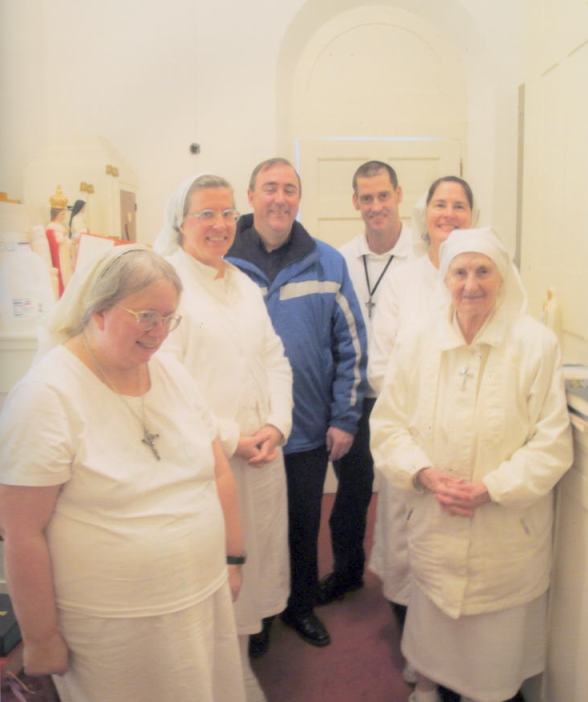
We see with distorted vision —
Lens we wear to look at things —
Faith in God helps us to see more
and more clearly through the
eyes of God —
A perfectionist or person who
ceases to admit their interior
problems for fear others will
see — is living a lie
1 John 4: 17-21
Love comes to its perfection in us when we can face the Day of Judgement fearlessly, because even in this world we have become as he is. In love there is no room for fear, but perfect love drives out fear, because fear implies punishment and no one who is afraid has come to perfection in love. Let us love, then, because he first loved us. Anyone who says 'I love God' and hates his brother, is a liar, since whoever does not love the brother whom he can see cannot love God whom he has not seen. Indeed this is the commandment we have received from him, that whoever loves God, must also love his brother.
Jeremiah Chapter 27
(At the beginning of the reign of Zedekiah son of Josiah, king of Judah, this word came to Jeremiah from Yahweh:) Yahweh said this to me, 'Make yourself thongs and yokes and put them on your neck. Then send them to the king of Edom, the king of Moab, the king of the Ammonites, the king of Tyre, and the king of Sidon, through their envoys accredited to Zedekiah king of Judah in Jerusalem. Give them the following message for their masters, "Yahweh Sabaoth, God of Israel, says this: You must tell your masters this: I by my great power and outstretched arm made the earth, the human beings and the animals that are on earth, and I give them to whom I please. For the present, I have handed all these countries over to Nebuchadnezzar king of Babylon, my servant; I have even put the wild animals at his service. (All the nations will serve him, his son and his grandson, until the time for his own country comes in its turn, when mighty nations and great kings will enslave him.) Any nation or kingdom that will not serve Nebuchadnezzar king of Babylon and will not bow its neck to the yoke of the king of Babylon, I shall punish that nation with sword, famine and plague, Yahweh declares, until I have destroyed it by his hand. For your own part, do not listen to your prophets, your diviners, dreamers, magicians and sorcerers, who tell you: You will not be enslaved by the king of Babylon. They prophesy lies to you, the result of which will be that you will be banished from your soil, that I shall drive you out, and you will perish. The nation, however, that is prepared to bend its neck to the yoke of the king of Babylon and serve him, I shall leave in peace on its own soil, Yahweh declares, to farm it and stay on it."
'To Zedekiah king of Judah I spoke in exactly the same terms. 'Bend your necks', I told him, 'to the yoke of the king of Babylon; serve him and his people and you will survive. (Why so anxious to die, you and your people, by sword, famine and plague, with which Yahweh has threatened the nation refusing to serve the king of Babylon?) Do not listen to the words the prophets say to you, "You will not be enslaved by the king of Babylon." They prophesy lies to you. Since I have not sent them, Yahweh declares, they prophesy untruths to you in my name. The result will be that I shall drive you out, you will perish, and so will the prophets who prophesy to you.'
I also spoke to the priests and to all this people as follows, 'Yahweh says this, "Do not listen to the words of your prophets who prophesy to you as follows: Look, the vessels of the Temple of Yahweh will very shortly be brought back from Babylon. They prophesy lies to you. (Do not listen to them; serve the king of Babylon and you will survive. Why should this city become a ruin?) If they are real prophets, if Yahweh's word is really with them, they ought now to be pleading with Yahweh Sabaoth that the remaining vessels in the Temple of Yahweh, in the palace of the king of Judah and elsewhere in Jerusalem, do not go to Babylon too! For this is what Yahweh Sabaoth says about (the pillars, the Sea, the stands and) the other vessels still remaining in this city, those not carried off by Nebuchadnezzar king of Babylon when he took Jeconiah son of Jehoiakim, king of Judah, into exile from Jerusalem to Babylon (with all the leading men of Judah and Jerusalem). Yes, this is what Yahweh Sabaoth, God of Israel, says about the vessels still remaining in the Temple of Yahweh, in the palace of the king of Judah and elsewhere in Jerusalem: They will be carried off to Babylon (and stay there until the day I punish them), Yahweh declares. (Then I shall bring them back and restore them to this place.)" '

22nd Sunday in Ordinary Time - August 31, 2008
– (Jeremiah 20, 7-9) Our first reading from the prophet Jeremiah goes back to 600 B.C. It sounds as if Jeremiah expected people would be grateful to him for speaking God’s word to them. But they only hated him for it. The people ridiculed him, threw him in jail and even tried to kill him by throwing him in a well. We hear him complaining to God, “You duped me! You tricked me, God!”INTRODUCTION
Jesus’ faithfulness to his mission would bring him suffering too, but Jesus did not feel tricked. He was well aware of what was going to happen. In today’s gospel, we hear him warning his disciples ahead of time.
Matthew 16: 21-27
First prophecy of the Passion
From then onwards Jesus began to make it clear to his disciples that he was destined to go to Jerusalem and suffer grievously at the hands of the elders and chief priests and scribes and to be put to death and to be raised up on the third day. Then, taking him aside, Peter started to rebuke him. ‘Heaven preserve you, Lord,’ he said, ‘this must not happen to you.’ But he turned and said to Peter, ‘Get behind me, Satan! You are an obstacle in my path, because you are thinking not as God thinks but as human beings do.’
The condition of following Christ
Then Jesus said to his disciples, ‘If anyone wants to be a follower of mine, let him renounce himself and take up his cross and follow me. Anyone who wants to save his life will lose it; but anyone who loses his life for my sake will find it. What, then, will anyone gain by winning the whole world and forfeiting his life? Or what can anyone offer in exchange for his life? ‘For the Son of man is going to come in the glory of his Father with his angels, and then he will reward each one according to his behaviour.
From the Gospel Fr. Joe explains
22nd Sunday in Ordinary Time -
August 31, 2008 (excerpt)Peter had faith in Jesus as we heard in last week’s gospel. He had just finished professing that Jesus was “the Messiah, the Son of the living God.” The words were hardly out of his mouth when Jesus said that being faithful to his mission, that being the Messiah, would cost him his life, but he would rise again. That didn’t Messiah would rally the Jewish people, he would defeat the Romans who occupied their land, he would bring back the days when Israel had their own king. That the Messiah would have to suffer was just not in the plan according to Peter. He was pretty bold telling Jesus “that’s not going to happen to you. You’re our savior. How can you save us by suffering? Ridiculous!” Jesus scolded Peter whom he had just praised for his faith and called him Satan. He was not saying Peter was evil. He was telling Peter he was doing Satan’s job of being a tempter, trying to convince Jesus that being faithful to his mission would be a piece of cake. Jesus knew history better than Peter. He knew what the prophets before him went through – people like Jeremiah or Jesus’ cousin John the Baptist, who was put to death by Herod. He could see things more clearly than Peter. Jesus told him “you have a lot to learn. You are thinking not as God does, but as human beings do.”
We might wonder how Peter was expected to think like anything other than a human being. After all that’s what he was. Peter wasn’t the Son of God. But there was a way, and there is a way for us to think like God does; that is, to learn from God, to listen to him, to believe what he tells us. It’s the way of prayer and faith. Basically that’s no different than learning from any great teacher. When we learn from a great teacher, we absorb their thoughts, their insights, their perspective, their truth. We begin to think like them. When God tells us something and we listen and we believe it, we’re seeing and knowing as God sees and knows, even if we can’t fully understand everything at the time. We’re beginning to think like God does. Peter’s problem was he stopped listening to Jesus when Jesus started talking about suffering and he started to dictate to Jesus the way things were going to be. That’s when he got into trouble.
We’ve been called to a life of prayer and faith. For us today, with freedom of religion, it is not as challenging for us to live that life as it was for those who followed Christ in the earliest days of the Church. People really did lose their lives and their fortunes for being Christians. We are blessed that we do not have to make the kind of life or death choice Christians did way back then. If we feel fortunate about it, shouldn’t we be willing to share our faith with others? One good way to do that would be to invite them to come to church with you or to come to our RCIA program which begins this Wednesday.
Coming to Mass, as we are doing now, teaches us to think as God does. We listen to what God speaks to us in the Scriptures. We profess our faith in his word. As we struggle with our own crosses and difficulties, we celebrate how Jesus overcame his sufferings and his cross through the resurrection. In that event we are given a vision of God’s plan of victory for all who live in his grace. Amen.
Thinking more and more as God wants us to —
Having faith —
Not seeing with greater and greater
distorted vision —
through old wounds etc.
through the lens of one who
seeks being right —
perfectionism —
worrying what people think
and not trying to seek
God's will —
old parental hang-ups
In the Prayer for Union —
We surrender ourselves to God —
We recognize it is God's grace
working in us when we are good and
we co-operate with the grace —
We ask God to come and possess our
soul —
We ask God to permeate our
soul —
We ask God to work in us —
We give ourselves to God in
the second paragraph —
to 'spoon' ourselves out —
to die to self and rise in Him —
We ask God to help us not to
give into satan —
Not to focus on ourselves, but
focus on God's will for us —
Not to listen to the promptings of
others that take us from
our work —
Including satan who keeps
working in old wounds
to try to deceive us and
our actions can become vices —
unloving, isolated, prideful,
envious patterns —
Where our goal is clear in this
prayer —
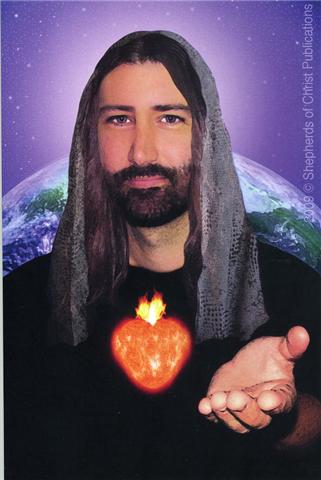
Prayer for Union with Jesus
Come to me, Lord, and possess my soul. Come into my heart and permeate my soul. Help me to sit in silence with You and let You work in my heart.
I am Yours to possess. I am Yours to use. I want to be selfless and only exist in You. Help me to spoon out all that is me and be an empty vessel ready to be filled by You. Help me to die to myself and live only for You. Use me as You will. Let me never draw my attention back to myself. I only want to operate as You do, dwelling within me.
I am Yours, Lord. I want to have my life in You. I want to do the will of the Father. Give me the strength to put aside the world and let You operate my very being. Help me to act as You desire. Strengthen me against the distractions of the devil to take me from Your work.
When I worry, I have taken my focus off of You and placed it on myself. Help me not to give in to the promptings of others to change what in my heart You are making very clear to me. I worship You, I adore You and I love You. Come and dwell in me now.
-God's Blue Book, January 17, 1994

Jeremiah DVD available
$15.00 free postage
From Fr. Joe's book
2 Samuel 7: 1-5
Once the king had settled into his palace and Yahweh had granted him rest from all the enemies surrounding him, the king said to the prophet Nathan, 'Look, I am living in a cedar' wood palace, while the ark of God is under awnings." Nathan said to the king, 'Go and do whatever you have in mind, for Yahweh is with you.' But that very night, the word of Yahweh came to Nathan: 'Go and tell my servant David, "Yahweh says this: Are you to build me a temple for me to live in?
INTRODUCTION – (Isaiah 7: 10-14, Romans 1: 1-7, Matthew 1: 18-24) We read almost every day about the problems in the Middle East. This is nothing new. Seven hundred thirty years before Christ there were problems too. The dominant power in the Middle East at that time was Assyria, an especially cruel and powerful nation whose capital was located in modern day Iraq, about 250 miles north of Baghdad. The king in Jerusalem at the time, King Ahaz felt threatened, not so much by Assyria, but by two smaller nations that were preparing to attack him. He decided to call on Assyria for help. The prophet Isaiah, the author of our first reading, warned: “Don’t do it. It will only cause more problems.” He promised: “God would keep the king and Jerusalem safe.” Ahaz did not have enough faith that God would do so. Isaiah told the king “Ask for a sign, ask for some proof.” But Ahaz, acting very pious, said he would not tempt God by asking for a sign. Isaiah offered one anyway. The sign Isaiah offered was most probably that God would give him a son who would succeed him. At this time he had no offspring for the king had already offered his only son in human sacrifice to Moloch, the pagan god of the Canaanites. God’s gift of another son would definitely be a sign that God would not let his lineage die out. Ahaz’ son would be called by the symbolic name Emmanuel for he would be a sign that God was with his people. It is a good possibility that the son Ahaz eventually had was Hezekiah who turned out to be a good leader and a king who was faithful to God. But St. Matthew saw in this promise of Isaiah a greater depth of meaning. He saw that Jesus fulfilled this promise perfectly by being born of a virgin and by being a sign to us that God is with us.
HOMILY - Both St. Matthew and St. Luke tell us about the unique way in which Jesus was conceived. St. Luke tells us the story in the beautiful gospel of the Annunciation where Mary is the central figure. St. Matthew’s gospel, which we just heard, tells the story as it was experienced by Joseph.
Joseph learned that Mary, his wife to be, was going to have a baby and he knew he was not the father. It might be worth mentioning that in that culture engagement was as much of a commitment as marriage. That’s why sometimes in the gospel it says Joseph and Mary were betrothed and sometimes Mary is called Joseph’s wife. It’s just that couples didn’t begin to live together until they were formally married. We do not know whether Mary told Joseph that it was by the power of the Holy Spirit that she conceived. I would like to think she did. And I would like to think that St. Joseph believed her and decided he was unworthy to be associated with such special people as Mary and her son to be – a son who was conceived by the Holy Spirit. Joseph decided to end their relationship. But if there were any questions Joseph might still have had, the angel made it clear to him. He was to take Mary into his home and he would be head of the family. As head of the family, Joseph would give Jesus his name, a Hebrew name meaning “Yahweh saves.” The angel makes a point of this when he tells Joseph “you are to name him Jesus because he will save his people from their sins.” It is also Joseph who would give Jesus his social status. That status was indicated by the way the angel greeted Joseph as “Joseph, son of David.” Jesus would belong to the house of David, a royal family. Other than the claim to be part of the family tree of King David, the descendants of King David had no power or authority or royal perks since the Babylonian exile 600 years before Christ. But the fact that Jesus had this social standing is very important for the people expected the Messiah to come from David’s line as God had promised David his kingdom would endure forever.
On this fourth Sunday of Advent, the Church is reminding us of the exulted dignity of the child whose birth we are about to celebrate. Humanly speaking, he is born into a kingly family. But he is more than human. He was conceived in a unique way, through the Holy Spirit, thus he is Son of God. Truly he is Emmanuel, God with us. He is our God who has come to save us as the name Jesus tells us. No wonder we celebrate.
Let us reflect for a moment on the name Emmanuel. St. Matthew tells us here, in the beginning of his gospel, that Jesus’ birth, in the fullest sense of the word, is the fulfillment of the prophecy of Isaiah. Jesus is God with us. If we go to the very end of St. Matthew’s gospel, in the very last verse, as Jesus was ascending into heaven, he told his disciples: “Behold, I am with you always, until the end of the age.” Jesus is God with us, a theme that begins and ends and runs all through Matthew’s gospel.
With all the evil and suffering in our world, it is a mystery why God would want to be with us. Of course, we know from everyday experience we want to be with those we love, so if that’s why God wants to be with us, and the gospels tell us that is why, then we ask why God would love us so? We have a hard time believing that God does love us at times, especially when we don’t love ourselves very much or when we have to face serious problems or tragedy. At those times we are tempted to feel as if he forgot us. Our only response to times of doubt is to choose to believe him when the tells us: “I am with you always.” There’s no easy way around the fact that we need to have lots of faith sometimes. There’s no easy way to have faith except to take time to pray.
One preeminent sign of his presence with us is the Eucharist. Here too we must choose to believe his words at the Last Supper were true when he said: “This is my body; this is my blood.” May our celebration of Christmas truly be a celebration of our belief in Emmanuel, “God is with us.” And may it lead us to a greater appreciation of the Eucharist we celebrate each week.
Sing: The Angel Gabriel
Sing: Silent Night
We are called to be in this Plan of
God the Father —
Mary was called —
We are called especially in the Shepherds of Christ
to help spread this consecration to
the New Adam, Jesus, and the New Eve, Mary —
The incarnation goes on in us —
We are to do God's will —
From Fr. Joe's Cycle B homily excerpt p. 26-27
This is why God sent his Son to us, to teach us and guide us. “The time has come,” he said as he began his public ministry. “The Kingdom of God is near. Turn away from your sins and believe in this good news.” As we heard in today’s gospel, Jesus needed help to announce this good news so he started choosing people who would help him.
Jesus said “I came that they may have life and may have it to the full.” Jesus’ teachings are good news. Sometimes, though, it doesn’t feel that way. Forgiving people who have hurt us, loving our enemies, getting up on Sunday morning when we’re tired, keeping the commandments, giving some of our hard earned money to others; sometimes it doesn’t feel like good news. That’s why he said, “believe in this good news,” because we don’t always feel it.
Turn away from sin is part of his message. “Turn away from sin” is the translation of a word from the Greek: μετάνοια which means a change of mind. Generally it is translated repentance or conversion. Jesus is telling us if we’re going to start believing in what he tells us we have to change our mind, to stop thinking and believing and doing what we used to.
Jeremiah 31: 7-9
For Yahweh says this:
Shout with joy for Jacob!
Hail the chief of nations!
Proclaim! Praise! Shout,
‘Yahweh has saved his people,
the remnant of Israel!’Watch, I shall bring them back
from the land of the north
and gather them in
from the far ends of the earth.
With them, the blind and the lame,
women with child, women in labour,
all together: a mighty throng
will return here!
In tears they will return,
in prayer I shall lead them.
I shall guide them to streams of water,
by a smooth path
where they will not stumble.
For I am a father to Israel,
and Ephraim is my first–born son.
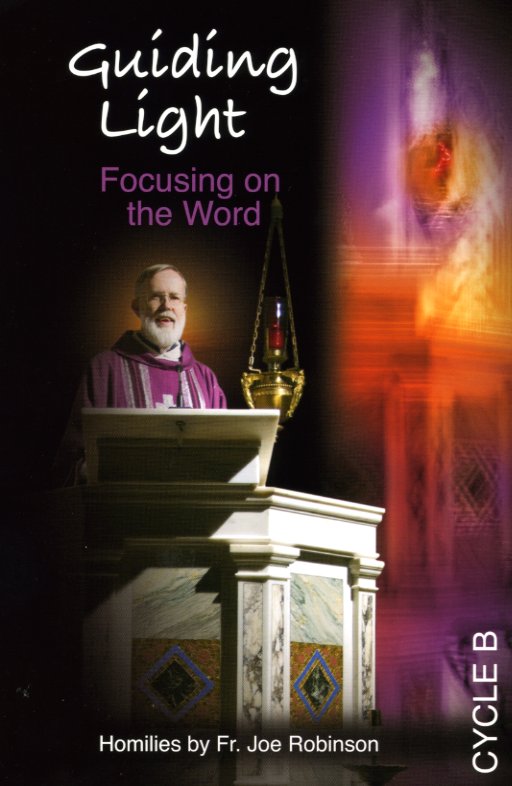
30th Sunday in Ordinary Time - October 29, 2006
INTRODUCTION: (Jeremiah 31, 7-9; Hebrews 5, 1-6; Mark 10, 46-52) The Jews have had numerous periods of great suffering throughout history. One of those difficult periods was during the Babylonian exile. The prophet who speaks to us in today’s first reading, Jeremiah, lived through it all. Before the exile he had the unpopular task of telling God's people what hey needed to do in order to avoid disaster – unpopular because he had to tell them they had to start obeying God's laws. Instead of heeding his counsel the people tried to kill Jeremiah. When the Babylonians descended upon Judah, they took many people captive as slaves to Babylon. Jeremiah could have said “I told you so.” But he didn’t. Instead he offered God's people hope. We hear him in today’s first reading telling a conquered people: “shout for joy for Jacob” for God would bring his people back home. Even the blind and the lame would not be left behind. The passage prepares us for the gospel where Jesus heals a blind man.
Daniel 7: 13-14
I was gazing into the visions of the night, when I saw, coming on the clouds of heaven, as it were a son of man. He came to the One most venerable and was led into his presence. On him was conferred rule, honour and kingship, and all peoples, nations and languages became his servants. His rule is an everlasting rule which will never pass away, and his kingship will never come to an end.

Feast of Christ the King - November 26, 2006
INTRODUCTION – (Daniel 7, 13-14; Rev. 1, 5-8; John 18, 33b-37) Today again we hear from the book of Daniel, a book that was written during a time when the Jews were suffering a terrible persecution for their faith. Today’s reading describes how God would triumph in the end. God would establish a kingdom that would be everlasting. God is here described as “the Ancient One.” His kingdom would be ruled by one who is described as “like a son of man.” God would give this “son of man” dominion, glory and kingship. The term “son of man” simply means a human being, but today’s passage invests the term with new depth and mystery. You might recall, “son of man” was the favorite term Jesus used to describe himself.
Fr. Carter addresses escapism
in his book Everyday and its
Possibilities —
He begins the chapter by a heroin
addicted, young man who 'coped out'
because he was addicted and died on the
steps —
But beyond addiction, procrastination —
is that person usually, having pain,
they are escaping from
Like the man who closes down
like a porcupine, hurt in love,
where do you go — when the greatest
commandment, commands us to love —
You are living then as a rival to
the will of God. A person must
eventually face reality or they go
further and further into escapism
or fantasy — Procrastinating when
God wants us to do something
brings us greater suffering
later on — Look at Jonah —
Escaping from reality is
against what God put us here for —
It is ignoring the importance
of our life, our vocation,
shutting down real growth which
is why we are here to be
preparing for heaven and to help build
God's Kingdom, be a witness and bear
fruit for the Kingdom of God —
to love and be Christ to one another —
Jesus suffered because of
our sins — He carried the cross —
We were created in His image and
likeness — we are to work with
others, communicate with others and
follow God's plan — Christ carried
the cross — His death bed — from
when He received it — He never
let go — He did the Father's will —
What suffering He endured doing God's will!!
Fantasies cost us no effort —
escaping through alcohol, drugs
whatever to flee reality —
We can flee the opportunities
of living, of future growth —
we deprive the world of our
generosity, our courage,
our loving ways.
We are to do God's will, not escape it —
This is how we are to live —
not escape His will and rebel
against it —
We see in the scripture
how people suffered who
did not do God's will —
Jeremiah - did God's will —
We see the saints who are witnesses
doing God's will —
Jesus did the will of His Father
The spiritual life is structured
by Christ's life, death and resurrection —
What is your god or God?
What would you hold onto over God?
What is #1 in your life?
What is God's will for you?
Fr. Carter would say
"What have I done for Christ?
What am I now doing for Christ?
What ought I to do for Christ?"
Sing: The Wedding Song
Fr. Carter says —
"Love as it grows in maturity —
moves toward non-possessiveness —
But this usually does not occur
without a struggle.
In the process of deeply loving
another there often is a tendency
to want to exclusively possess
the other. This temptation has
to be vigorously resisted if we
are to continue loving another
authentically — really promoting
the good of the one loved —"
We are to lead that person — if we
are a leader to being in that
love union with God — maturely
loving God and loving all others —
not with foolish demand for self
fulfillment, but to love so both
are loving as God wills them to
love all others in their vocation.
Fr. Carter says
"To love another or others deeply
also has repercussions relative
to our loving all others. —
The deep love we develop for one
or a few individuals develops
our capacity to love all others
more maturely" — according to
God's will —
Fr. Carter says "Deep love for another, then,
if it is really Spirit - led,
is a community - forming activity.
It expands our possibilities for
contributing to the love dynamism
which is at the heart of community."
Fr. Carter says:
"Love is its own reward"
Loving deeply, Fr. Carter, says means
we will have suffering —
but can lead us to great
happiness —
Fr. Carter says "To love properly is itself
this happiness"
Doing all things as God wills —
not more of something — not
less — Fr. Carter always told me
Fr. Carter said
"Doing God's will in love"
Job 1: 21
and said: Naked I came from my mother's womb, naked I shall return again. Yahweh gave, Yahweh has taken back. Blessed be the name of Yahweh!
Fr. Carter wrote this in an early book
"Thanks my friend.
Thanks for sharing life with me.
Thanks for standing at my side and
looking at life together
with me.
Thanks for looking at life's truth
with me, at life's beauty,
at life's goodness —"
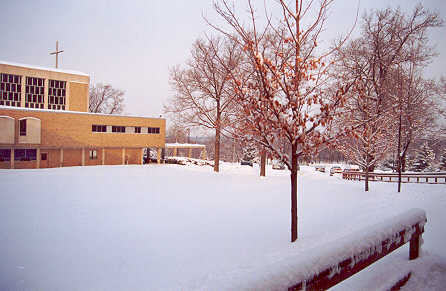
February 10, 2007
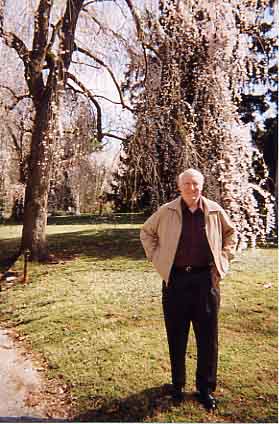

3Excerpt from Priestly Newsletter 1998 - ISSUE FOUR
Shortly before he was to die from cancer, Joseph Cardinal Bernardin left us these inspiring words about peace: "It is the first day of November, and fall is giving way to winter. Soon the trees will lose the vibrant colors of their leaves and snow will cover the ground. The earth will shut down, and people will race to and from their destinations bundled up for warmth. Chicago winters are harsh. It is a time of dying.
"But we know that spring will soon come with all its new life and wonder.
"It is quite clear that I will not be alive in the spring. But I will soon experience new life in a different way...
"What I would like to leave behind is a simple prayer that each of you may find what I have found—God's special gift to us all: the gift of peace. When we are at peace, we find the freedom to be most fully who we are, even in the worst of times. We let go of what is non-essential and embrace what is essential. We empty ourselves so that God may more fully work within us. And we become instruments in the hands of the Lord."
Notes:
3. Joseph Cardinal Bernardin, The Gift of Peace, Loyola University Press, pp. 151-153.
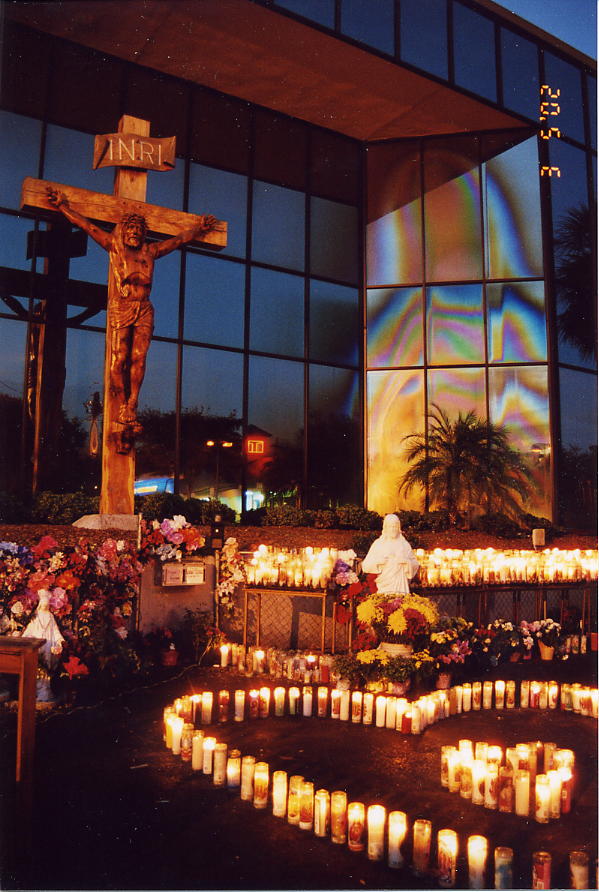
March 5, 2002
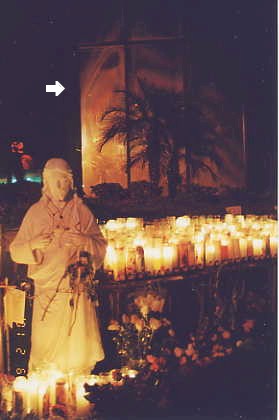
February 5, 2001
From Fr. Carter
"Thanks for looking at pain,
at the suffering, at
the evil of life with me."
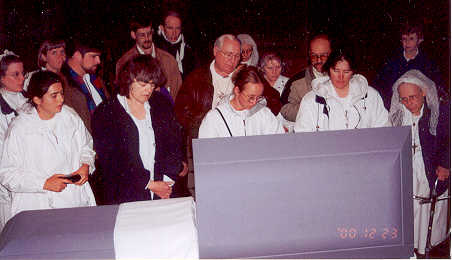
Fr. Carter said —
"Thanks for helping understand
this pain, this evil, this
suffering."
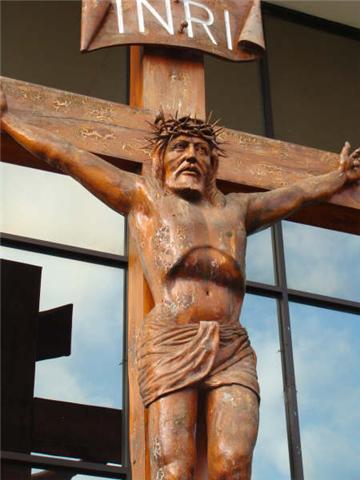
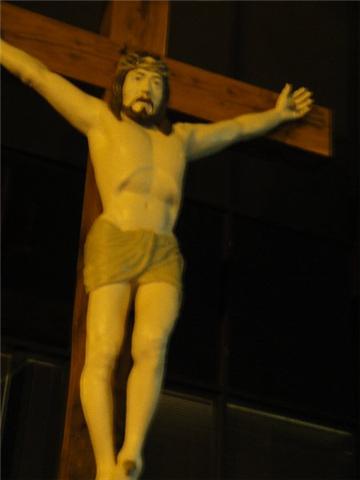
Fr. Carter said:
"Thanks for sharing with me
your vision of life's mystery,
its love, its wonder,
its grandeur, its possibilities
for great accomplishment,
its possibility for fidelity
to the details of everyday
living"
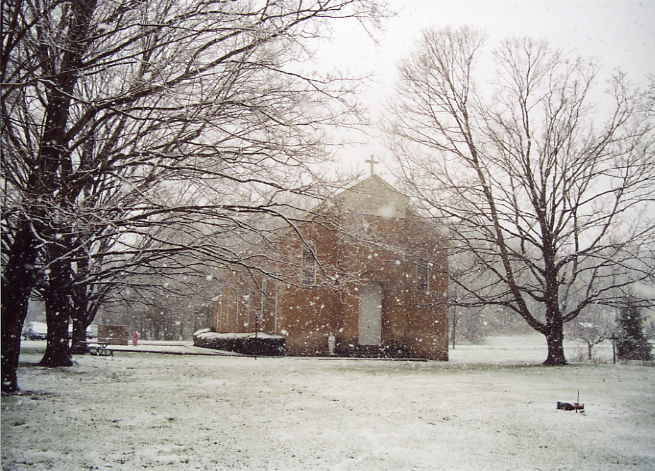

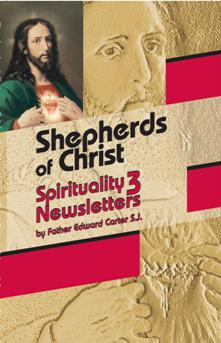

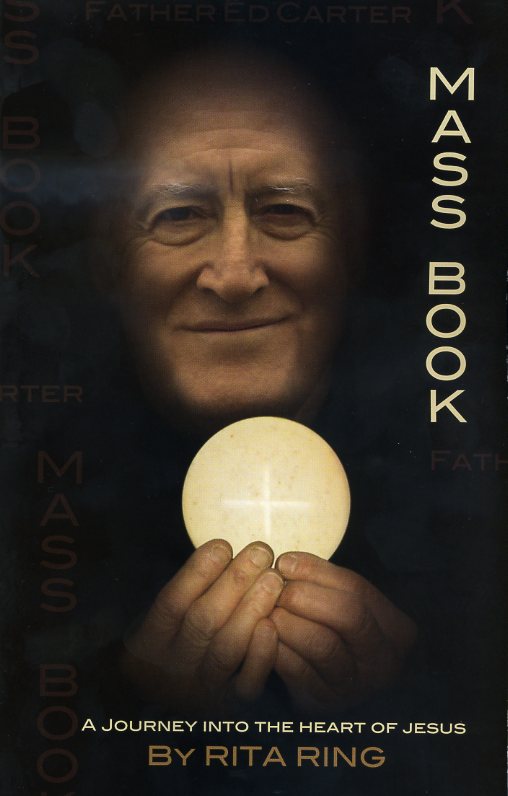


shipped from the printers |

Mary appeared |
Fr. Carter said:
"Thanks for helping me see that this
fidelity springs forth,
not from the fact that we
are primarily looking at
the external dimension of
what we do, which may be so
ordinary and seemingly insignificant,

Fr. Carter had a dream.
Excerpt from Response in Christ by Fr. Edward Carter, S.J.
e) Relationship with Members of the Church
There is but one true Church of Christ. Yet this one Church has three different states of existence. There is the pilgrim Church, the Church of this world, composed of members who have received the grace of Christ and strive for its development. They have not yet obtained the goal of their efforts, as have the members of the heavenly Church, who enjoy God in eternal happiness. The Church suffering is an intermediate state of existence necessary for those who had not achieved the required purification as members of the pilgrim Church. Although there are these three phases of the Church’s existence, there is a profound union existing between all the members. All these members possess the same basic life of grace in Christ, and this common life establishes the most intimate bonds of love. In our preceding chapter, we discussed the pilgrim Church. Let us now consider the Church suffering and the heavenly Church.
The members of the Church suffering are those who have departed from this life in an incomplete state of Christian development. Their development is incomplete in the sense that grace has not fully taken possession of them, and, as a result, they are yet closed in upon themselves to a greater or lesser degree. They as yet cannot open themselves out in complete love to the Triune God in the beatific vision. They must undergo a further purification, a purification which could have been achieved upon earth with merit. Now the purification must be achieved with no merit attached. The pain of this purification is mixed with the certain expectation of achieving the vision of God. We can hasten the advent of this vision for this people by the offering of prayers and other good works. Scripture itself refers to our action on behalf of those in purgatory in Chapter 12 of the Second Book of Maccabees beginning with verse 38.
The members of the heavenly Church are those in whom the life of grace has taken full possession and has reached its completion in the life of glory. Faith now is unnecessary, as the light of glory gives the human intellect a new strength and capacity for seeing God face-to-face. While the Christian was a wayfarer, he received the imprint of the indwelling Trinity as he shared in God’s own life. Now in heaven that grace-life and possession of God reaches its completion—the absolute completion is not achieved, however, until the resurrection of the body. The divine persons give Themselves to the beatified in a profound union far surpassing that of the indwelling of the Trinity experienced here below.
This life of heaven is still the Christ-life, for just as we possess a share in Trinitarian life here below as mediated by Christ, and exercise this grace-life as structured by Him, so also in heaven is the mediation of Christ present. In the words of Rahner, "One always sees the Father through Jesus. Just as immediately as this, for the directness of the vision of God is not a denial of the mediatorship of Christ as man."14 And not only does the humanity of Christ unite the blessed to God, but also, in some way, to the whole of creation. This is merely a completion of what is begun here below, namely, the union with Christ in His humanity establishing the Christian in a special relationship with God, with other men, and with the whole of creation. We have a glimpse, therefore, of the fullness of life which members of the heavenly Church possess.
The heavenly Church, as St. Thomas says, is the true Church.15 The Church of this earth and the Church of purgatory are, each in its own way, reaching out in loving hope for the heavenly Jerusalem. Vatican II puts it very simply: "The Church, to which we are called in Christ Jesus, and in which we acquire sanctity through the grace of God, will attain her full perfection only in the glory of heaven."16
The members of the heavenly Church can help us in living our life of grace until we too share its fullness with them. Their power of intercession on our behalf is but another ramification of the communal aspect of Christianity. We are meant to help others grow in Christ. We, in turn, are intended by God to receive aid from others—yes, from members of the heavenly Church, as well as from those with whom we dwell here below.
Not only can we be aided by the saints’ intercession, but the example of the canonized saints can also be of great value to us. They have concretely proved that full holiness is possible. Such an inspiration is of real worth when we are tempted to think that Christian sanctity in its higher degrees is impossible of attainment. Moreover, the canonized saints, in their diversity, teach us that there are many authentic versions of Christian holiness. They can be innovators in showing us that there are numerous possibilities in assimilating the mystery of Christ, although the basic assimilation remains the same for all Christians of all times. In the opinion of Rahner this is one of the chief roles the canonized saints exert in the life of the Church.17
NOTES:
14Karl Rahner, Theological Investigations, Vol. III (Baltimore: Helicon, 1967), p. 44.
15 Cf. St. Thomas Aquinas, In Ad Ephes., c. 3, Lect. 3.
16Second Vatican Council, Constitution on the Church, No. 48.
17Cf. Karl Rahner, Op. cit., pp. 100-101.
Fr. Carter said:
"Thanks, my friend, for sharing sorrow
with me. You have been with
me in the sorrows rising out
of the little pains of everyday
living"

11/24/2009
The Holy Father wishes me to express his gratitude for your kind gift of a collection of homilies by Fr. Joe Robinson. He appreciates your thoughtful gesture. His Holiness will remember you and your associates in his prayers. Invoking upon all of you joy and peace in our Lord Jesus Christ, he cordially imparts his Apostolic Blessing. Holy Father
We have sent over 15,000,000
Priestly Newsletters in over 16 years —
Fr. Carter said:
"Thanks my friend for sharing
joy with me"

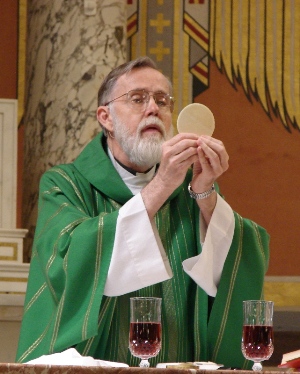
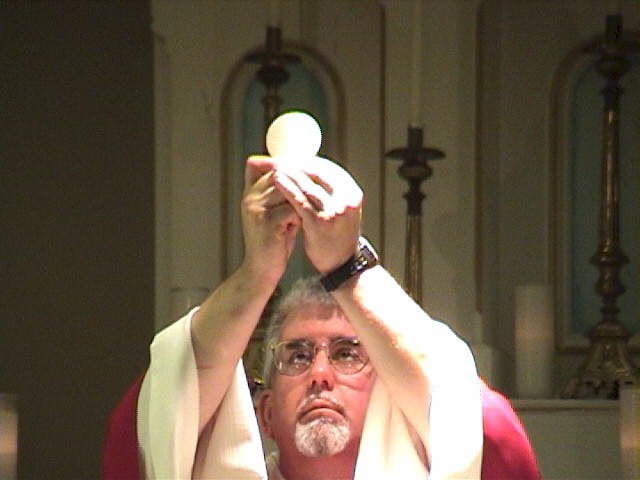
"Thanks for sharing the joys of nature"
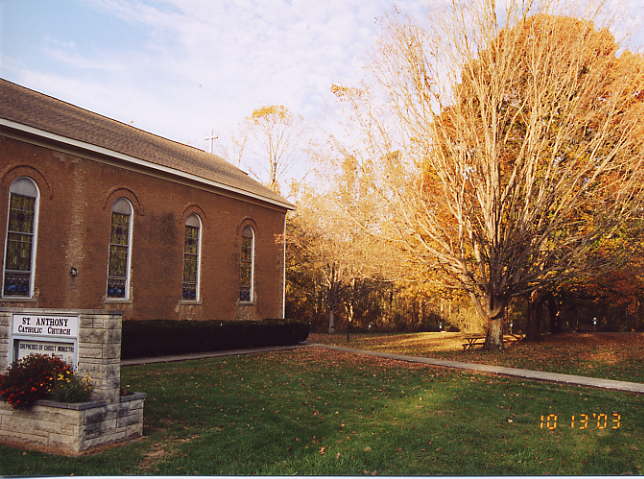
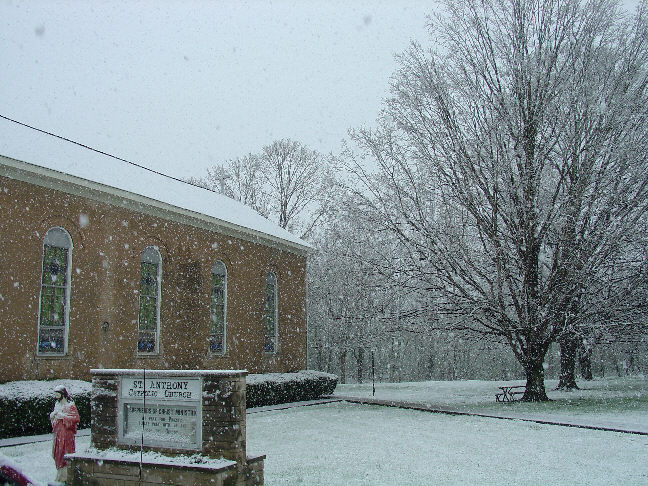
Fr. Carter said
"Thanks, my friend, for helping
me to accomplish"
Our Mission and the Consecration to the Two Hearts
The Father has a Plan. This is the time He chose us to be here to help the souls that Jesus died for. We are brothers in Christ. We are to live in love of God and others. We are to recognize our part in uniquely loving and building God’s Kingdom here and now.
We have circulated 15,000,000 Priestly Newsletters in books and individually for 16 years at the direction of Fr. Carter, S.J., our founder.
1. We hope Bishops consecrate their diocese to the Sacred Heart and Immaculate Heart and spread this devotion as Mary asked for at Fatima. Fr. Carter said, July 31, 1994, Jesus asked him to begin these prayer chapters.
2. The more people consecrate themselves, their homes, the schools, the Churches and all places to the Sacred Heart and Immaculate Heart, the more we will go to the period of peace Mary promised at Fatima.
“But in the end, my Immaculate Heart will triumph, the Holy Father will consecrate Russia to me, Russia will be converted, and a certain period of peace will be granted to the world.” Our Lady’s Peace Plan, op cit., p.5.
"Thanks for helping me know about
life"

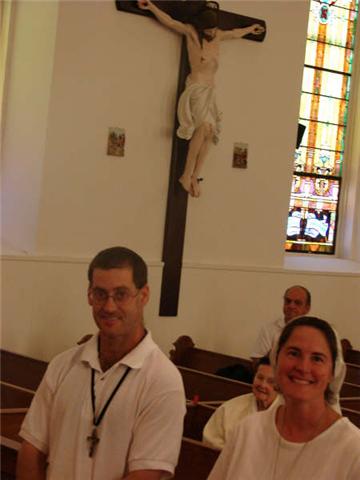
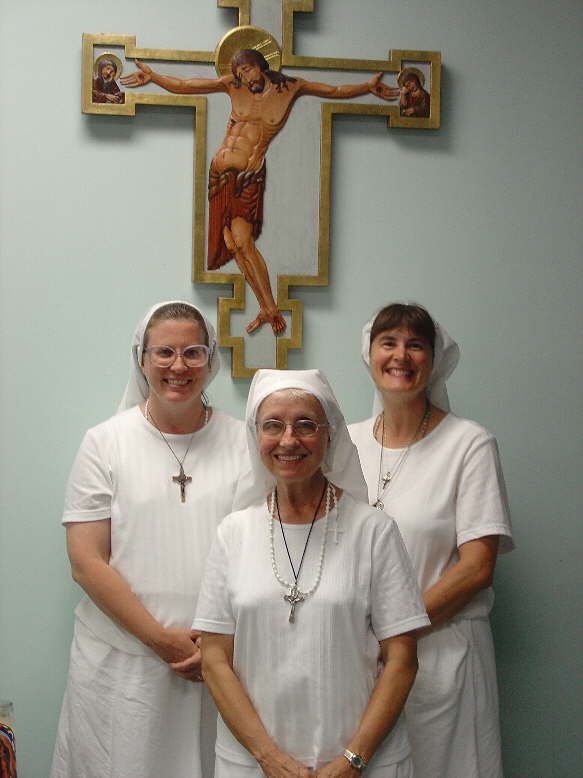
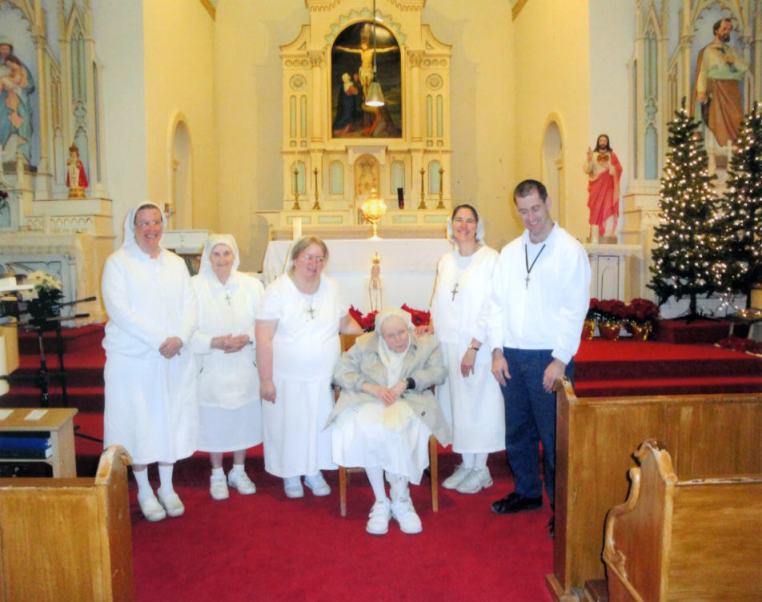
Fr. Carter said
"Thanks for helping me know
about myself and helping
me to become."
Thanks for helping me to know
Jesus better.
Thanks, my friend —
When we give love — it lasts
in the hearts of men when we
are gone —
Fr. Carter says in an early book
"Love is meant to be forever
because of the basic
nature of love"
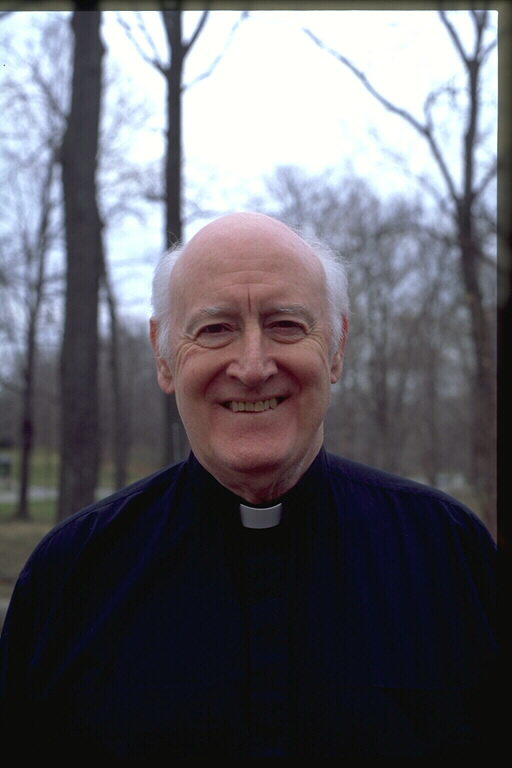
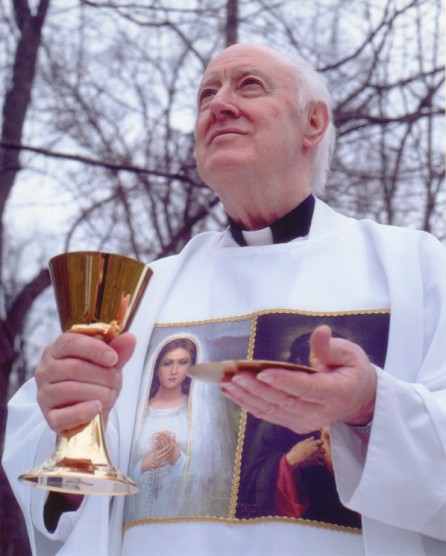
"Love in any of its forms
is a gift of self to
promote the authentic
goodness of happiness of
the other —"
Love is especially good for those
who endure the struggles
building a community of love
where God is the head and
people live serving Him and
loving as the Father intends
Love endures suffering —
Love endures pain —
Love forgives
Love is reconciled —
God wants commitment and love
to one's vocation —
Seeing the bigger picture
through the eyes of God the Father —
Seeing the bigger picture
through the eyes of faith —
Order your Christmas presents that last!
Please remember us when buying
your
Christmas gifts.

$1.00 plus shipping
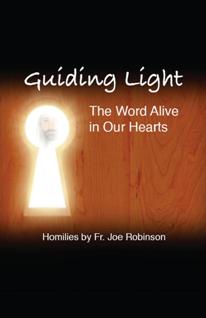

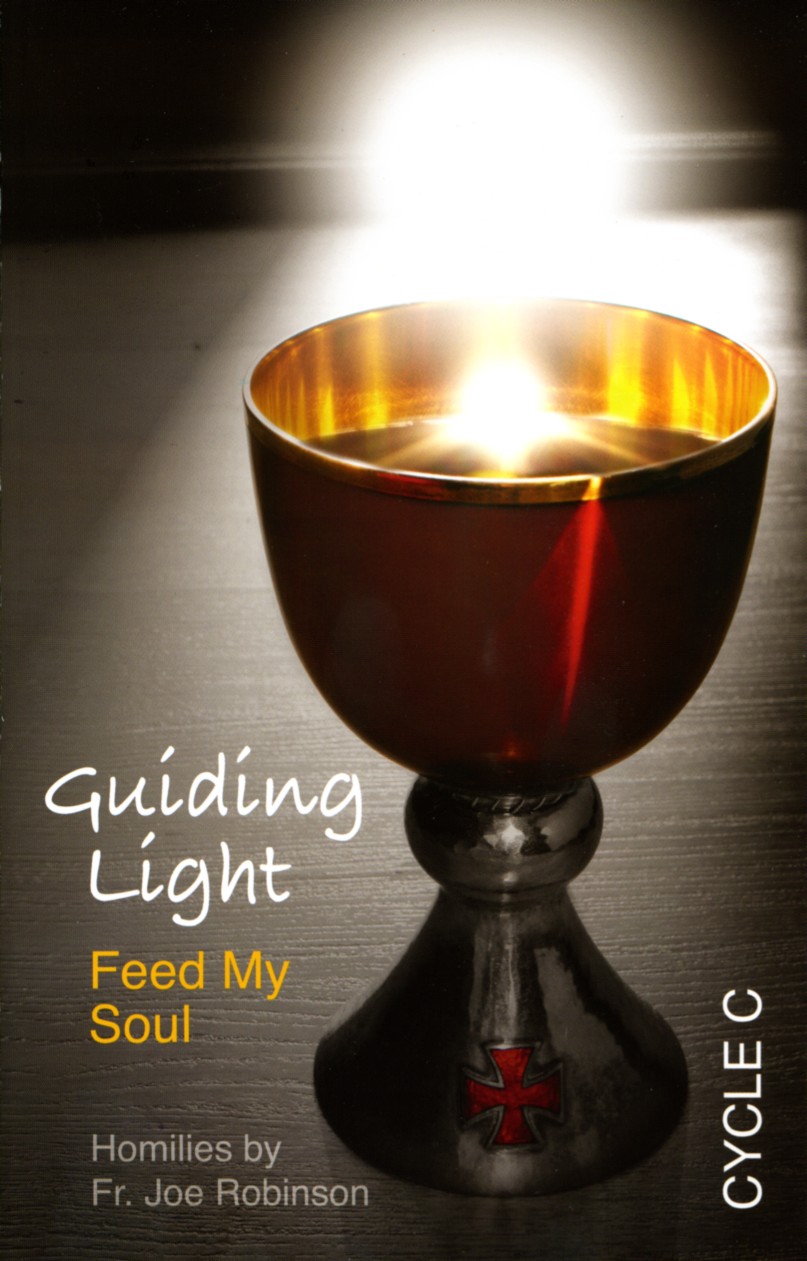

Homilies by Fr. Joe Robinson
$10.00 each plus shipping
Call Doris
1-888-211-3041
| Rita Ring |
|
||||||||||||||||||||||||||||||||||||||||||||||||||||||||||||||||||||||||||||||||||||||||||||||||||||||||||||||||||||||||||||||||||||||||||||||||||||||||||||||
| Fr. Joe Robinson |
|
|
|
|
|

|
|
|
|

|
|
|
|

|
|
|
|
| Fr. Edward J. Carter |
|
||||||||||||||||||||||||||||||||||||||||||||||||||||||||||||||||||||||||||||||||||||
|
|||||||||||||||||||||||||||||||||||||||||||||||||||||||||||||||||||||||||||||||
|
||||||||||||||||||||||||||||||||||||||||||||||||||||||||||||||||||||||||||||||||||||||||||||||||
Get a canvas print of Mary's image
with a sliver of glass and
a little bottle of
Jesus and Mary water.The glass will be fixed behind the
back of the picture.Cost — $200.00
Also available
a cup with a Mary's image on it
Cost — $15
Call Doris
1-888-211-3041
or
1-727-725-9312

Rosaries with Mary's Image Available
Aurora Borealis Beads6mm - $30.00
8mm - $40.00
Call Doris
1-888-211-3041
or
1-727-725-9312
Statues
Sacred Heart of Jesus w/glass - 18
Our Lady-Guadalupe w/glass - 12
Limpias - 8
Immaculate Heart w/glass - 18
I Heart - Ivory w/glass - 18
Our Lady of Grace w/glass - 18
Our Lady-Mt. Carmel w/glass - 18
Our Lady of Lourdes w/glass - 18
Infant of Prague w/glass - 24
Sacred Heart of Jesus w/glass - 24
Sacred Heart -Blessing w/glass - 24
Sorrowful Mother w/glass - 24
I Heart - Ivory w/glass - 24
I Heart of Mary w/glass - 24
Our Lady of Lourdes w/glass - 24
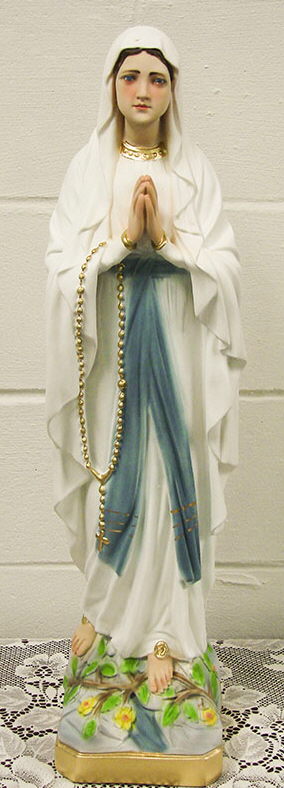
Our Lady-Guadalupe w/glass - 28
Our Lady of Grace w/glass - 24
Our Lady-Mt. Carmel w/glass - 24
St. Padre Pio
St. Joseph
St. Therese
St. Francis
St. Anthony
St. Claire
Limpias
St. Jude
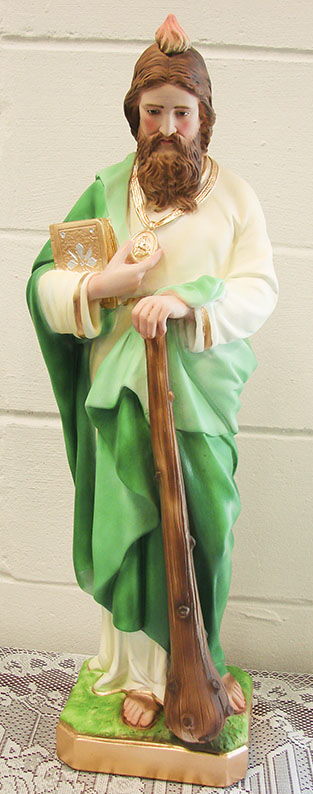
Divine Mercy
Holy Family
Angel
St. Philomena
Pieta - Marble
Pieta - Color
Holy Family
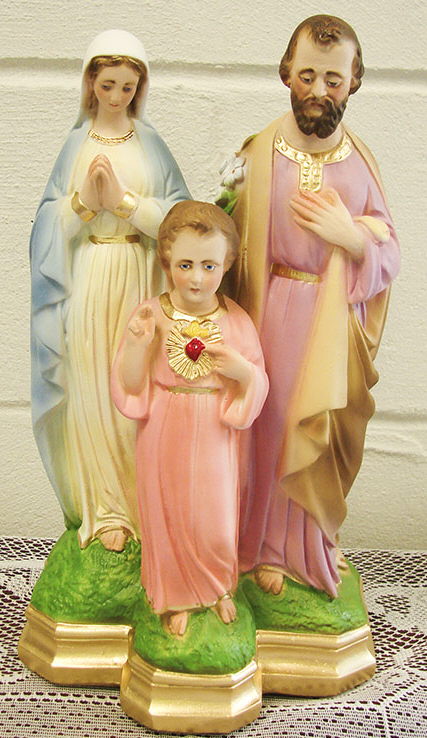
St. Anthony - 18
St. Francis - 18
St. Joseph - 18
St. Therese - 18
St. Rita - 18
St. Clare - 12

St. Rita - 12
St. Padre Pio - 12
Divine Mercy - 12
St. Michael - 11
Shepherds of Christ Ministries
P. O. Box 627
China, IN 47250
Toll free - 1-888-211-3041
Local - 1-812-273-8405
fax - 1-812-273-3182
web: www.sofc.org
e-mail: info@sofc.org
Size Price Quantity Holy Family
24"
$180
Limpias
24"
$125
St. Anthony
24"
$125
St. Claire
24"
$125
St. Francis
24"
$125
St. Joseph
24"
$125
St. Jude
24"
$125
St. Padre Pio
24"
$125
St. Therese
24"
$125
Divine Mercy 22"
$125 Angel 22"
$100 St. Philomena 20"
$100 St. Philomena 16"
$65 St. Joseph 18"
$65 St. Francis 18"
$65 St. Anthony 18"
$65 St. Rita 18"
$65 St. Therese 18"
$65 Pieta - Color 15" $75 Pieta - Marble 15" $75 Holy Family 12"
$60 St. Padre Pio - standing 12"
$40 St. Padre Pio - sitting 8"
$50 St. Michael 11"
$40 St. Rita 12"
$40 Divine Mercy
12"
$40 St. Claire 12"
$40 Limpias 8"
$25 Our Lady of Guadalupe w/glass 28"
$500 Our Lady of Mt. Carmel w/glass 24"
$500 Immaculate Heart of Mary w/glass
24"
$500 Immaculate Heart - Ivory w/glass
24"
$500 Infant of Prague w/glass
24"
$500 Our Lady of Grace w/glass
24"
$500 Our Lady of Lourdes w/glass
24"
$500 Sacred Heart of Jesus w/glass 24"
$500 Sacred Heart -Blessing w/glass 24"
$500 Sorrowful Mother w/glass
24"
$500 Immaculate Heart of Mary w/glass 18"
$300 Immaculate Heart - Ivory w/glass 18"
$300 Sacred Heart of Jesus w/glass 18"
$300 Our Lady of Lourdes w/glass 18"
$300 Our Lady of Grace w/glass 18"
$300 Our Lady of Mt. Carmel w/glass
18" $300 Our Lady of Guadalupe w/glass 12"
$200 Fatima w/glass
11"
$150 Fatima w/glass
18"
$250 Pilgrim Virgin w/glass 12"
$160 Pilgrim Virgin w/glass 15" $200 Pilgrim Virgin w/glass 18" $250 Pilgrim Virgin w/glass 27"
$450
Call for Shipping Price (1-888-211-3041)
Name
Sub-Total Address
IN Tax (7%) City
Shipping State Zip
Donation Telephone
Order Total
Call Doris
1-888-211-3041
or
1-727-725-9312
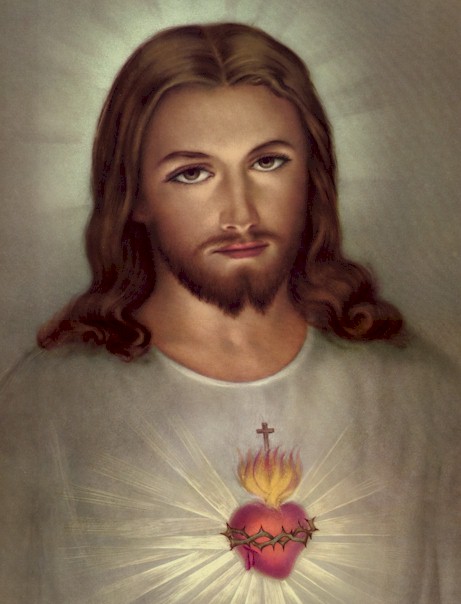
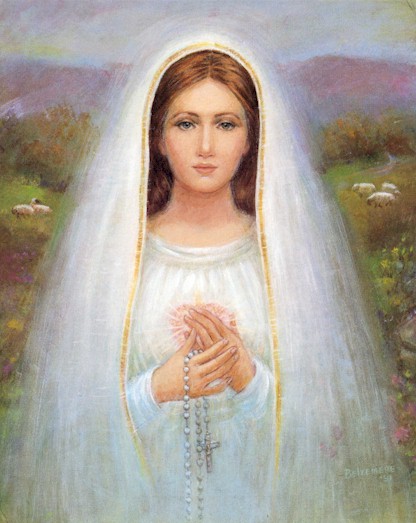
Immaculate Heart and Sacred Heart Pictures Available
with & without frames - different sizes available
Call Doris
1-888-211-3041
or
1-727-725-9312
 Copyright
© 2003 Shepherds
of Christ.
Copyright
© 2003 Shepherds
of Christ.
Rights for non-commercial
reproduction granted:
May be copied in its entirety, but neither re-typed nor edited.
Translations are welcome but they must be reviewed for moral and
theological accuracy by a source approved by Shepherds of Christ Ministries
before any distribution takes place. Please contact us for more information.
All scripture quotes are from the
New Jerusalem Bible, July 1990, published by Doubleday.
Revised: June 23,
2003
URL: http://www.sofc.org
Contact Information for Shepherds
of Christ
Email: info@SofC.org
Shepherds of Christ Ministries
P.O. Box 193
Morrow, Ohio 45152-0193
Telephone: (toll free) 1-888-211-3041 or (513) 932-4451
FAX: (513) 932-6791